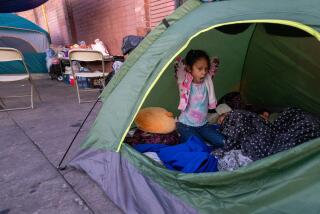Gulf Refugees Safe in S.D., Baby and All
- Share via
SAN DIEGO — The Chihwaro family of Kuwait City bluffed their way past Iraqi border guards, endured two days jammed into a subcompact car, and made do with bread and cheese for the 800-mile journey to Damascus, Syria.
But it was their baby daughter, Miriam, wrapped in red tape almost as surely as in a diaper, who stopped their flight to relatives in the United States.
Born in the confusion after Iraq’s invasion of Kuwait, she had no birth certificate, so she couldn’t be allowed into the United States, her parents were told at the U.S. Embassy in Damascus.
On Wednesday, a month after reaching Syria, the Chihwaros landed in San Diego to the teary-eyed jubilation of a dozen relatives who used stateside help to get them out of Syria.
“I can’t believe she stayed alive,” Georgette Chihwaro said of her 6-week-old daughter. “She’s OK. She’s a good girl.”
Indeed, the infant squalled healthily as cousins, aunts and uncles took turns kissing and cuddling her.
Patiently answering questions as his exhausted wife searched for a baby bottle, Raymond Chihwaro said the family spent 25 days hiding at home after the Iraqi invasion. Natives of Lebanon who have become American citizens, they feared for their safety.
So their only foray outside as food ran short was for Miriam’s birth in a Kuwait City hospital Aug. 14. On Aug. 26, they fled the country by car.
“We left at the right time, because they had closed the border for a couple of days, and we moved immediately when they reopened,” Chihwaro said. “We used papers saying that we belong to Lebanese nationality.
“It was a small Japanese car, and six or seven people stuck in the car. I had my 4 1/2-year-old son sitting on my lap for about two days, the whole trip.”
Once in Syria, they discovered their worries weren’t over.
“The birth was not documented, therefore the State Department could not document that it was their child,” said Blanca Sauermann, immigration caseworker for Rep. Jim Bates (D-San Diego). “They needed to verify that the child was indeed theirs.”
Their San Diego County relatives--Raymond Chihwaro’s two brothers and a sister and their families--knew they had to do something to help.
“I called everywhere at the State Department,” said brother Razallah Chihwaro, who owns a hair salon and a deli in downtown San Diego. “The State Department was very helpful, but there are so many people who have the same circumstances, so they really cannot do anything about it.”
Finally, an appeal to Bates’ San Diego office helped resolve the problem. Within 24 hours of being contacted last week by Sauermann, the State Department had OKd the baby’s entry into the United States.
Sauermann said she handles 25 to 100 immigration cases a week for the congressman, but “this one was unique, because she’s the youngest little victim I’ve ever come across. For something like this to happen to a baby so young--it’s bizarre. It’s a one-in-a-million type of case.”
The family arrived in New York on Tuesday night, then flew to San Diego via Los Angeles on Wednesday afternoon. It had been a long and emotional journey that left its mark on all of them.
Exhausted, her face pale, Georgette Chihwaro begged reporters not to question her. “Maybe tomorrow,” she said. Baby Miriam fussed in the background.
Sons Norman, 9, and Allan, 4 1/2, looked perplexed as relatives scooped them up for bear hugs and kisses, and TV lights blazed in their faces.
Shyly and with his eyes gradually misting over, Norman explained to the microphones that mostly he hadn’t been scared. But he did remember the time when the family thought gunfire was moving toward their residence. It was on the day Miriam was born, Norman said.
“That was the day when they started hitting, when she was born,” he said. “They hit at the palace. There was nobody inside, but we thought it was coming somewhere near our house. So we stayed by the door, ready to run out.”
He was a good big brother on the trip to a new home, Norman said. “I’m the most one who took care of her,” he said. “As soon as she sees me, she starts smiling.”
His father, an architect who had been working for the Kuwaiti public works ministry, said he’ll be looking for a job in San Diego--where they lived for seven years before moving to Kuwait four years ago. All their money and belongings were left behind, so they’ll be with relatives in Spring Valley for a while, he said.
“All I care about is that we’re safe,” he said. “Everybody asks, ‘How about your money? How about your belongings?’ I don’t care. We’re safe. That’s all that I care about.”
More to Read
Sign up for Essential California
The most important California stories and recommendations in your inbox every morning.
You may occasionally receive promotional content from the Los Angeles Times.












